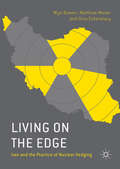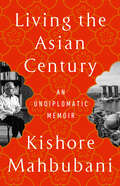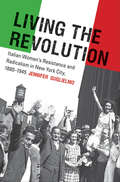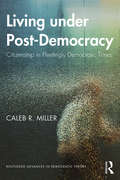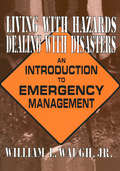- Table View
- List View
Living in the Future: Sovereignty and Internationalism in the Canterbury Tales
by Susan NakleyNationalism, like medieval romance literature, recasts history as a mythologized and seamless image of reality. Living in the Future analyzes how the anachronistic nationalist fantasies in Geoffrey Chaucer’s Canterbury Tales create a false sense of England’s historical continuity that in turn legitimized contemporary political ambitions. This book spells out the legacy of the Tales that still resonates throughout English literature, exploring the idea of England in the medieval literary imagination as well as critiquing more recent centuries’ conceptions of Chaucer’s nationalism. Chaucer uses two extant national ideals, sovereignty and domesticity, to introduce the concept of an English nation into the contemporary popular imagination and reinvent an idealized England as a hallowed homeland. For nationalist thinkers, sovereignty governs communities with linguistic, historical, cultural, and religious affinities. Chaucerian sovereignty appears primarily in romantic and household contexts that function as microcosms of the nation, reflecting a pseudo-familial love between sovereign and subjects and relying on a sense of shared ownership and judgment. This notion also has deep affinities with popular and political theories flourishing throughout Europe. Chaucer’s internationalism, matched with his artistic use of the vernacular and skillful distortions of both time and space, frames a discrete sovereign English nation within its diverse interconnected world. As it opens up significant new points of resonance between postcolonial theories and medieval ideas of nationhood, Living in the Future marks an important contribution to medieval literary studies. It will be essential for scholars of Middle English literature, literary history, literary political and postcolonial theory, and literary transnationalism.
Living in the Future: Utopianism and the Long Civil Rights Movement
by Victoria W. WolcottLiving in the Future reveals the unexplored impact of utopian thought on the major figures of the Civil Rights Movement. Utopian thinking is often dismissed as unrealistic, overly idealized, and flat-out impractical—in short, wholly divorced from the urgent conditions of daily life. This is perhaps especially true when the utopian ideal in question is reforming and repairing the United States’ bitter history of racial injustice. But as Victoria W. Wolcott provocatively argues, utopianism is actually the foundation of a rich and visionary worldview, one that specifically inspired the major figures of the Civil Rights Movement in ways that haven’t yet been fully understood or appreciated. Wolcott makes clear that the idealism and pragmatism of the Civil Rights Movement were grounded in nothing less than an intensely utopian yearning. Key figures of the time, from Martin Luther King Jr. and Pauli Murray to Father Divine and Howard Thurman, all shared a belief in a radical pacificism that was both specifically utopian and deeply engaged in changing the current conditions of the existing world. Living in the Future recasts the various strains of mid-twentieth-century civil rights activism in a utopian light, revealing the power of dreaming in a profound and concrete fashion, one that can be emulated in other times that are desperate for change, like today.
Living in the Future: Utopianism and the Long Civil Rights Movement
by Victoria W. WolcottLiving in the Future reveals the unexplored impact of utopian thought on the major figures of the Civil Rights Movement. Utopian thinking is often dismissed as unrealistic, overly idealized, and flat-out impractical—in short, wholly divorced from the urgent conditions of daily life. This is perhaps especially true when the utopian ideal in question is reforming and repairing the United States’ bitter history of racial injustice. But as Victoria W. Wolcott provocatively argues, utopianism is actually the foundation of a rich and visionary worldview, one that specifically inspired the major figures of the Civil Rights Movement in ways that haven’t yet been fully understood or appreciated. Wolcott makes clear that the idealism and pragmatism of the Civil Rights Movement were grounded in nothing less than an intensely utopian yearning. Key figures of the time, from Martin Luther King Jr. and Pauli Murray to Father Divine and Howard Thurman, all shared a belief in a radical pacificism that was both specifically utopian and deeply engaged in changing the current conditions of the existing world. Living in the Future recasts the various strains of mid-twentieth-century civil rights activism in a utopian light, revealing the power of dreaming in a profound and concrete fashion, one that can be emulated in other times that are desperate for change, like today.
Living in the Shadow of the Cross: Understanding and Resisting the Power and Privilege of Christian Hegemony
by Paul KivelHow our dominant Christian worldview shapes everything from personal behavior to public policy (and what to do about it)Over the centuries, Christianity has accomplished much which is deserving of praise. Its institutions have fed the hungry, sheltered the homeless, and advocated for the poor. Christian faith has sustained people through crisis and inspired many to work for social justice.Yet although the word "Christian" connotes the epitome of goodness, the actual story is much more complex. Over the last two millennia, ruling elites have used Christian institutions and values to control those less privileged throughout the world. The doctrine of Christianity has been interpreted to justify the killing of millions, and its leaders have used their faith to sanction participation in colonialism, slavery, and genocide. In the Western world, Christian influence has inspired legislators to continue to limit women's reproductive rights and has kept lesbians and gays on the margins of society.As our triple crises of war, financial meltdown, and environmental destruction intensify, it is imperative that we dig beneath the surface of Christianity's benign reputation to examine its contribution to our social problems. Living in the Shadow of the Cross reveals the ongoing, everyday impact of Christian power and privilege on our beliefs, behaviors, and public policy, and emphasizes the potential for people to come together to resist domination and build and sustain communities of justice and peace.Paul Kivel is the award-winning author of Uprooting Racism and the director of the Christian Hegemony Project. He is a social justice activist and educator who has focused on the issues of violence prevention, oppression, and social justice for over forty-five years.
Living on Fire: The Life of L. Brent Bozell Jr.
by Daniel Kelly&“A triumph . . . A moving, beautifully written biography.&” —National ReviewFrom the beginning, L. Brent Bozell seemed destined for great things. An extraordinary orator, the young man with fiery red hair won a national debate competition in high school and later was elected president of Yale&’s storied Political Union, where his debating partner was his close friend William F. Buckley Jr. In less than a decade after graduating from Yale, Bozell helped Buckley launch National Review, became a popular columnist and speaker, and, most famously, wrote Barry Goldwater&’s landmark book The Conscience of a Conservative. But after setting his sights on high political office, Bozell took a different route in the 1960s. He abruptly moved his family to Spain; he founded a traditional Catholic magazine, Triumph, that quickly turned radical; he repudiated on religious grounds the U.S. Constitution; he made it his mission to transform America into a Catholic nation; he led the nation&’s first major antiabortion protest (featuring a militant group known as the Sons of Thunder); he severed ties with his erstwhile friends from the conservative movement, including Buckley (who was also his brother-in-law). By the mid-1970s, Bozell had fallen prey to bipolar disorder and alcoholism, leading life as if &“manacled to a roller coaster.&” Biographer Daniel Kelly tells Bozell&’s remarkable story vividly and with sensitivity in Living on Fire. To write this book, Kelly interviewed dozens of friends and family members and gained unprecedented access to Bozell&’s private correspondence. The result is a richly textured portrait of a gifted, complex man—his triumphs as well as his struggles.
Living on the Edge
by Wyn Bowen Dina Esfandiary Matthew MoranIn this book, the authors explore the controversial Iranian nuclear programme through the conceptual lens of nuclear hedging. In 2002, revelations regarding undeclared nuclear facilities thrust Iran's nuclear activities under the spotlight and prompted concerns that Tehran was pursuing nuclear weapons. Iran has always denied nuclear weapons aspirations, yet it cannot be disputed that the Islamic Republic has gone well beyond what is required for a civil nuclear programme based on energy production and scientific research. What, then, is the nature and significance of Iran's nuclear behaviour? Does it form part of a coherent strategy? What can Iran's actions in the nuclear field tell us about Tehran's intentions? And what does the Iranian case teach us about proliferation behaviour more generally? This book addresses these questions by exploring the nature of nuclear hedging and how this approach might be identified, before applying this logic to the Iranian case. It provides fresh insights into the inherently opaque area of nuclear proliferation and a more nuanced interpretation of the Iranian nuclear challenge.
Living on the Edge: Climate Change and Human-Wildlife Interactions in the Buxa Tiger Reserve of India
by Tetsushi Sonobe Pritha Datta Bhagirath Behera Dil Bahadur RahutIn a rapidly changing climate, understanding the complex interactions between humans and wildlife is crucial for fostering coexistence. This book offers an in-depth analysis of how climate change exacerbates conflicts between local communities and wildlife in the Buxa Tiger Reserve. Through historical insights, current challenges, and community narratives, it reveals the adaptive strategies employed by villagers and their unintended consequences on wildlife. Readers will gain valuable insights into the cascading effects of these conflicts and find evidence-based policy recommendations aimed at promoting sustainable and harmonious coexistence. Essential for conservationists, policymakers, and anyone interested in sustainable development, this book provides practical solutions for mitigating human-wildlife conflicts in the face of climate change.
Living on the Edge: Texas During the Civil War and Reconstruction
by Patrick J Kelly Rhonda Minten"Living on the Edge: Texas During the Civil War and Reconstruction explores the complex issues faced by Texans in the Civil War era. Through a wide range of primary source documents, the book sheds light on a distinct historical perspective born of the combination of geographic location and cultural diversity. The readings and primary source documents in the book record both exceptional and mundane events of everyday life during a dramatic and fascinating era. While students may already be familiar with slavery, secession, the war years, and the Reconstruction period, they will gain new insight into history through personal writings such as slave narratives and diaries. In addition, speeches and ads, government reports, and political documents reflect the perspective and concerns of society at the time. The geographic position of Texas combined with its cultural diversity make the history of Texas in the Civil War era unique. Living on the Edge: Texas During the Civil War and Reconstruction offers a look at an aspect of American history that is suitable for courses in Civil War history, Texas history, and historical methods. Patrick Kelly earned his Ph.D. at New York University. Before joining the faculty at the University of Texas, San Antonio, Dr. Kelly lectured at Harvard University and was a visiting professor at Tufts University. He is the author of Creating a National Home: Building the Veterans' Welfare State, 1860-1900 and "The North American Crisis of the 1860s." Rhonda Minten, who earned her master's degree in history at the University of Texas, San Antonio, is now an adjunct professor and lecturer in the Department of History, where she teaches courses in world civilizations, United States history, and Texas history. Professor Minten also teaches at Northwest Vista College."
Living the 1.5 Degree Lifestyle: Why Individual Climate Action Matters More than Ever
by Lloyd AlterStop thinking about efficiency and start thinking about sufficiency Living the 1.5 Degree Lifestyle reveals the carbon cost of everything we do, identifying where we can make big reductions, while not sweating the small stuff.The international scientific consensus is that we have less than a decade to drastically slash our collective carbon emissions to keep global heating to 1.5 degrees and avert catastrophe. This means that many of us have to cut our individual carbon footprints by over 80% to 2.5 tonnes per person per year by 2030. But where to start?Drawing on Lloyd Alter's journey to track his daily carbon emissions and live the 1.5 degree lifestyle, coverage includes:What it looks like to live a rich and truly green lifeFrom take-out food, to bikes and cars, to your internet usage – finding the big wins, ignoring the trivial, and spotting marketing ploysThe invisible embodied carbon baked into everything we own and why electric cars aren't the answerHow to start thinking about sufficiency rather than efficiencyThe roles of individuals versus governments and corporations.Grounded in meticulous research and yet accessible to all, Living the 1.5 Degree Lifestyle is a journey toward a life of quality over quantity, and sufficiency over efficiency, as we race to save our only home from catastrophic heating.
Living the Asian Century: An Undiplomatic Memoir
by Kishore MahbubaniIn this stirring memoir, a preeminent politician and diplomat traces the transformation of the Republic of Singapore from a poor colony into an Asian powerhouse. In Living the Asian Century, Kishore Mahbubani vividly chronicles his own life going from a poor childhood in a multiethnic neighborhood to an illustrious diplomatic career that led him far from Singapore to the United States. Along the way Mahbubani has become one of Asia&’s most widely known commentators and spokespeople, with a unique perspective that straddles India, China, and the West.
Living the Dream: New Immigration Policies and the Lives of Undocumented Latino Youth
by Melissa R Michelson Jessica L Lavariega Monforti Maria ChavezIn 2012, President Obama deferred the deportation of qualified undocumented youth with his policy of Deferred Action for Childhood Arrivals forever changing the lives of the approximately five million DREAMers currently in the United States. Formerly illegal, a generation of Latino youth have begun to build new lives based on their newfound legitimacy. In this book, the first to examine the lives of DREAMers in the wake of Obama s deferred action policy, the authors relay the real-life stories of more than 100 DREAMers from four states. They assess the life circumstances in which undocumented Latino youth find themselves, the racializing effects generated by current immigration public discourse, and the permanent impact of this policy environment on DREAMers in America."
Living the Revolution: Italian Women's Resistance and Radicalism in New York City, 1880-1945
by Jennifer GuglielmoItalians were the largest group of immigrants to the United States at the turn of the twentieth century, and hundreds of thousands led and participated in some of the period's most volatile labor strikes. Yet until now, Italian women's political activism and cultures of resistance have been largely invisible. In Living the Revolution, Jennifer Guglielmo brings to life the Italian working-class women who helped shape the vibrant, transnational, radical political culture that expanded into the emerging industrial union movement. Guglielmo imaginatively documents the activism of two generations of New York and New Jersey women who worked in the needle and textile trades. She explores the complex and distinctive ways immigrant women and their American-born daughters drew on Italian traditions of protest to form new urban female networks of everyday resistance and political activism. And she shows how their commitment to revolutionary and transnational social movements diminished as they became white working-class Americans. The rise of fascism, the Red Scare, and the deprivations of the Great Depression led many to embrace nationalism and racism, ironically to try to meet the same desires for economic justice and dignity that had inspired their enthusiasm for anarchism, socialism, and communism.
Living under Post-Democracy: Citizenship in Fleetingly Democratic Times (Routledge Advances in Democratic Theory)
by Caleb R. MillerWhen money equates to power and the system is rigged in favor of wealthy elites, why do we still pretend we are living in a democracy? In Living under Post-Democracy, Caleb R. Miller challenges us to admit what we already know: that most of us are effectively powerless over the political decisions that govern our lives. Instead, we should embrace a 'post-democratic' view of politics, one which recognizes the way in which our political institutions fail—both systematically and historically—to live up to our democratic ideals, while also acknowledging our tragic, yet enduring attachment to them both. Offering a new framework for conceptualizing contemporary citizenship, Miller explores how a post-democratic perspective can help us begin to reorient ourselves in our paradoxical, fractured political landscape. This model of citizenship opens the possibility for a distinctly post-democratic approach to both political participation and political philosophy, treating them not as ways of affecting politics, but as opportunities for therapeutically engaging with the ongoing challenges and inevitable frustrations of post-democratic life. This book is an excellent addition to courses on democratic theory, as well as introductory courses to political theory.
Living with Bad Surroundings: War, History, and Everyday Moments in Northern Uganda
by Sverker FinnströmSince 1986, the Acholi people of northern Uganda have lived in the crossfire of a violent civil war, with the Lord's Resistance Army and other groups fighting the Ugandan government. Acholi have been murdered, maimed, and driven into displacement. Thousands of children have been abducted and forced to fight. Many observers have perceived Acholiland and northern Uganda to be an exception in contemporary Uganda, which has been celebrated by the international community for its increased political stability and particularly for its fight against AIDS. These observers tend to portray the Acholi as war-prone, whether because of religious fanaticism or intractable ethnic hatreds. In Living with Bad Surroundings, Sverker Finnstrm rejects these characterizations and challenges other simplistic explanations for the violence in northern Uganda. Foregrounding the narratives of individual Acholi, Finnstrm enables those most affected by the ongoing "dirty war" to explain how they participate in, comprehend, survive, and even resist it. Finnstrm draws on fieldwork conducted in northern Uganda between 1997 and 2006 to describe how the Acholi--especially the younger generation, those born into the era of civil strife--understand and attempt to control their moral universe and material circumstances. Structuring his argument around indigenous metaphors and images, notably the Acholi concepts of good and bad surroundings, he vividly renders struggles in war and the related ills of impoverishment, sickness, and marginalization. In this rich ethnography, Finnstrm provides a clear-eyed assessment of the historical, cultural, and political underpinnings of the civil war while maintaining his focus on Acholi efforts to achieve "good surroundings," viable futures for themselves and their families.
Living with China: Finding a Middle Power's Middle Way
by Wendy DobsonLiving with China makes the case to Canadians to adopt a forward-looking China strategy that recognizes forty years of successful reforms as foundations of President Xi Jinping’s ambitious long game to 2049, the centenary of the founding of the People’s Republic. Looking forward, market reforms will be key drivers of China’s long-term growth yet Chinese policy is ambivalent about the potential dangers of spontaneous market forces undermining the Party’s central goal of political stability. These tensions are pointed out in the book’s early chapters that outline what Canadians need to know about the Chinese economy. Getting the foundations right by growing at sustainable rates and dealing with unproductive state-owned enterprises; promoting innovation as a future growth driver and modernizing the fragile financial system are all works in progress where tensions between ‘plan’ and market forces are apparent. Two chapters also examine how Chinese enterprises are going global through direct investments and participation in the dynamic but troubled Belt and Road Initiative. Urging Canadians to up their game with a China strategy takes place in an environment of rising tensions over trade and technology, evident in negotiating the ‘new NAFTA’ with Americans and doing business with Huawei, the China-based telecommunication giant. Living with China is one of the first comprehensive volumes to be published in Canada on a forward-looking Canada-China strategy. The recommended strategy includes more leadership from top officials, building a Canada brand, strengthening our international human capital, addressing security issues and negotiating bilateral trade and investment liberalization. The book also points out the importance of addressing such key issues as intellectual property protection, cybersecurity and discussing value differences such as respect for individual rights.
Living with Climate Change: How Communities Are Surviving and Thriving in a Changing Climate
by Damon P. Coppola Jane A. Bullock George D. Haddow Kim S. HaddowThe climate has changed and communities across America are living with the consequences: rapid sea level rise, multi-state wildfires, heat waves, and enduring drought. Living with Climate Change: How Communities Are Surviving and Thriving in a Changing Climate details the steps cities are taking now to protect lives and businesses, to reduce their vulnerability, and to adapt and make themselves more resilient. The authors included in this book have been directly involved in the successful design and implementation of community-based adaptation and resilience programs.
Living with Energy Poverty: Perspectives from the Global North and South (Routledge Explorations in Energy Studies)
by Paola Velasco-Herrejón Breffní Lennon Niall P. DunphyLiving with Energy Poverty: Perspectives from the Global North and South expands our collective understanding of energy poverty and deepens our recognition of the phenomenon by engaging with the lived experiences of energy-poor households across different contexts. Understanding the lived experience of energy poverty is an essential component in the design of any effort to alleviate what is fundamentally a deep-rooted, multi-faceted, wickedly complex problem. This requires a nuanced understanding of the causal factors and the research methods that can respond to the flexible spatial and temporal nature of the condition, as well as its wellbeing and justice implications. Drawing together the expertise and connectedness of authors from the Global South and North, this book presents novel approaches to understanding the often hidden forms of domestic energy deprivation. Case studies from 20 countries provide critical perspectives on this phenomenon while analysing the policy practices, government strategy, and sustainability implications of divergent manifestations. The book takes a multidimensional perspective, challenging the bias towards energy production and service provision, which often do not align with the aspirations and realities of energy households across global contexts, thus facilitating a useful dialogue on the nature of energy poverty. The book is a timely source for policymakers, practitioners, and scholars seeking fresh, diverse insights into the everyday reality of energy poverty and wanting to better understand the challenges a people-centred, just energy transition can present.
Living with Energy Poverty: Perspectives from the Global North and South (Routledge Explorations in Energy Studies)
by Paola Velasco-Herrejón Breffní Lennon Niall P. DunphyLiving with Energy Poverty: Perspectives from the Global North and South expands our collective understanding of energy poverty and deepens our recognition of the phenomenon by engaging with the lived experiences of energy-poor households across different contexts.Understanding the lived experience of energy poverty is an essential component in the design of any effort to alleviate what is fundamentally a deep-rooted, multi-faceted, wickedly complex problem. This requires a nuanced understanding of the causal factors and the research methods that can respond to the flexible spatial and temporal nature of the condition, as well as its wellbeing and justice implications. Drawing together the expertise and connectedness of authors from the Global South and North, this book presents novel approaches to understanding the often hidden forms of domestic energy deprivation. Case studies from 20 countries provide critical perspectives on this phenomenon while analysing the policy practices, government strategy, and sustainability implications of divergent manifestations. The book takes a multidimensional perspective, challenging the bias towards energy production and service provision, which often do not align with the aspirations and realities of energy households across global contexts, thus facilitating a useful dialogue on the nature of energy poverty.The book is a timely source for policymakers, practitioners, and scholars seeking fresh, diverse insights into the everyday reality of energy poverty and wanting to better understand the challenges a people-centred, just energy transition can present.Chapter 1 of this book is freely available as a downloadable Open Access PDF at http://www.taylorfrancis.com under a Creative Commons [Attribution-Non Commercial-No Derivatives (CC-BY-NC-ND)] 4.0 license.Chapter 2 of this book is freely available as a downloadable Open Access PDF at http://www.taylorfrancis.com under a Creative Commons [Attribution-Non Commercial-No Derivatives (CC-BY-NC-ND)] 4.0 license.Chapter 22 of this book is freely available as a downloadable Open Access PDF at http://www.taylorfrancis.com under a Creative Commons [Attribution-Non Commercial-No Derivatives (CC-BY-NC-ND)] 4.0 license.
Living with Environmental Change: Social Vulnerability, Adaptation and Resilience in Vietnam (Routledge Research In Global Environmental Change Ser. #No.6)
by W. Neil Adger P. Mick Kelly Nguyen Huu NinhVietnam and the neighbouring countries of Southeast Asia face diverse challenges created by the rapid evolution of their social, economic and environmental systems and resources. Taking a multidisciplinary perspective, this book provides a comprehensive assessment of the Vietnamese situation, identifying the factors shaping social vulnerability and resilience to environmental change and considering prospects for sustainable development.
Living with Environmental Change: Waterworlds
by Kirsten Hastrup Cecilie RubowClimate change is a lived experience of changes in the environment, often destroying conventional forms of subsistence and production, creating new patterns of movement and connection, and transforming people’s imagined future. This book explores how people across the world think about environmental change and how they act upon the perception of past, present and future opportunities. Drawing on the ethnographic fieldwork of expert authors, it sheds new light on the human experience of and social response to climate change by taking us from the Arctic to the Pacific, from the Southeast Indian Coastal zone to the West-African dry-lands and deserts, as well as to Peruvian mountain communities and cities. Divided into four thematic parts - Water, Landscape, Technology, Time – this book uses rich photographic material to accompany the short texts and reflections in order to bring to life the human ingenuity and social responsibility of people in the face of new uncertainties. In an era of melting glaciers, drying lands, and rising seas, it shows how it is part and parcel of human life to take responsibility for the social community and take creative action on the basis of a localized understanding of the environment. This highly original contribution to the anthropological study of climate change is a must-read for all those wanting to understand better what climate change means on the ground and interested in a sustainable future for the Earth.
Living with Guns: A Liberal's Case for the Second Amendment
by Craig WhitneyNewtown. Columbine. Virginia Tech. Tucson. Aurora. Gun violence on a massive scale has become a plague in our society, yet politicians seem more afraid of having a serious conversation about guns than they are of the next horrific shooting. Any attempt to change the status quo, whether to strengthen gun regulations or weaken them, is sure to degenerate into a hysteria that changes nothing. Our attitudes toward guns are utterly polarized, leaving basic questions unasked: How can we reconcile the individual right to own and use firearms with the right to be safe from gun violence? Is keeping guns out of the hands of as many law-abiding Americans as possible really the best way to keep them out of the hands of criminals? And do 30,000 of us really have to die by gunfire every year as the price of a freedom protected by the Constitution? In Living with Guns, Craig R. Whitney, former foreign correspondent and editor at the New York Times, seeks out answers. He re-examines why the right to bear arms was enshrined in the Bill of Rights, and how it came to be misunderstood. He looks to colonial times, surveying the degree to which guns were a part of everyday life. Finally, blending history and reportage, Whitney explores how twentieth-century turmoil and culture war led to today’s climate of activism, partisanship, and stalemate, in a nation that contains an estimated 300 million guns--and probably at least 60 million gun owners. In the end, Whitney proposes a new way forward through our gun rights stalemate, showing how we can live with guns--and why, with so many of them around, we have no other choice.
Living with HIV and Dying with AIDS: Diversity, Inequality and Human Rights in the Global Pandemic (Global Health)
by Lesley DoyalThere is now a vast literature on HIV and AIDS but much of it is based on traditional biomedical or epidemiological approaches. Hence it tells us very little about the experiences of the millions of people whose living and dying constitute the reality of this devastating pandemic. Doyal brings together findings from a wide range of empirical studies spanning the social sciences to explore experiences of HIV positive people across the world. This will illustrate how the disease is physically manifested and psychologically internalised by individuals in diverse ways depending on the biological, social, cultural and economic circumstances in which they find themselves. A proper understanding of these commonalities and differences will be essential if future strategies are to be effective in mitigating the effects of HIV and AIDS. Doyal shows that such initiatives will also require a better appreciation of the needs and rights of those affected within the wider context of global inequalities and injustices. Finally, she outlines approaches to address these challenges. This book will appeal to everyone involved in struggles to improve the well-being of those with HIV and AIDS. While academically rigorous, it is written in an accessible manner that transcends specific disciplines and, through its extensive bibliography, provides diverse source material for future teaching, learning and research.
Living with Hate in American Politics and Religion: How Popular Culture Can Defuse Intractable Differences
by Jeffrey IsraelIn the United States, people are deeply divided along lines of race, class, political party, gender, sexuality, and religion. Many believe that historical grievances must eventually be left behind in the interest of progress toward a more just and unified society. But too much in American history is unforgivable and cannot be forgotten. How then can we imagine a way to live together that does not expect people to let go of their entrenched resentments?Living with Hate in American Politics and Religion offers an innovative argument for the power of playfulness in popular culture to make our capacity for coexistence imaginable. Jeffrey Israel explores how people from different backgrounds can pursue justice together, even as they play with their divisive grudges, prejudices, and desires in their cultural lives. Israel calls on us to distinguish between what belongs in a raucous “domain of play” and what belongs in the domain of the political. He builds on the thought of John Rawls and Martha Nussbaum to defend the liberal tradition against challenges posed by Frantz Fanon from the left and Leo Strauss from the right. In provocative readings of Lenny Bruce’s stand-up comedy, Philip Roth’s Portnoy’s Complaint, and Norman Lear’s All in the Family, Israel argues that postwar Jewish American popular culture offers potent and fruitful examples of playing with fraught emotions. Living with Hate in American Politics and Religion is a powerful vision of what it means to live with others without forgiving or forgetting.
Living with Hazards, Dealing with Disasters: An Introduction to Emergency Management
by William L WaughThis is the first concise introduction to emergency management, the emerging profession that deals with disasters from floods and earthquakes to terrorist attacks. Twenty case studies illustrate the handling of actual disasters including the Northridge Earthquake and the Oklahoma City Bombing. Discussion questions and guides to on-line information sources facilitate use of the book in the classroom and professional training programs.
Living with Insecurity in a Brazilian Favela
by R. Ben PenglaseThe residents of Caxambu, a squatter neighborhood in Rio de Janeiro, live in a state of insecurity as they face urban violence Living with Insecurity in a Brazilian Favela examines how inequality, racism, drug trafficking, police brutality, and gang activities affect the daily lives of the people of Caxambu. Some Brazilians see these communities, known as favelas, as centers of drug trafficking that exist beyond the control of the state and threaten the rest of the city. For other Brazilians, favelas are symbols of economic inequality and racial exclusion. Ben Penglase's ethnography goes beyond these perspectives to look at how the people of Caxambu themselves experience violence Although the favela is often seen as a war zone, the residents are linked to each other through bonds of kinship and friendship. In addition, residents often take pride in homes and public spaces that they have built and used over generations. Penglase notes that despite poverty, their lives are not completely defined by illegal violence or deprivation. He argues that urban violence and a larger context of inequality create a social world that is deeply contradictory and ambivalent. The unpredictability and instability of daily experiences result in disagreements and tensions, but the residents also experience their neighborhood as a place of social intimacy. As a result, the social world of the neighborhood is both a place of danger and safety.




